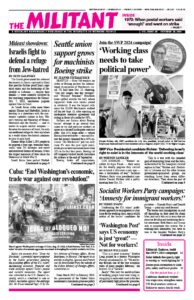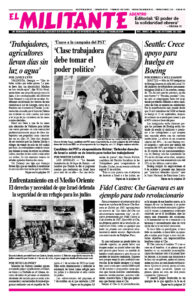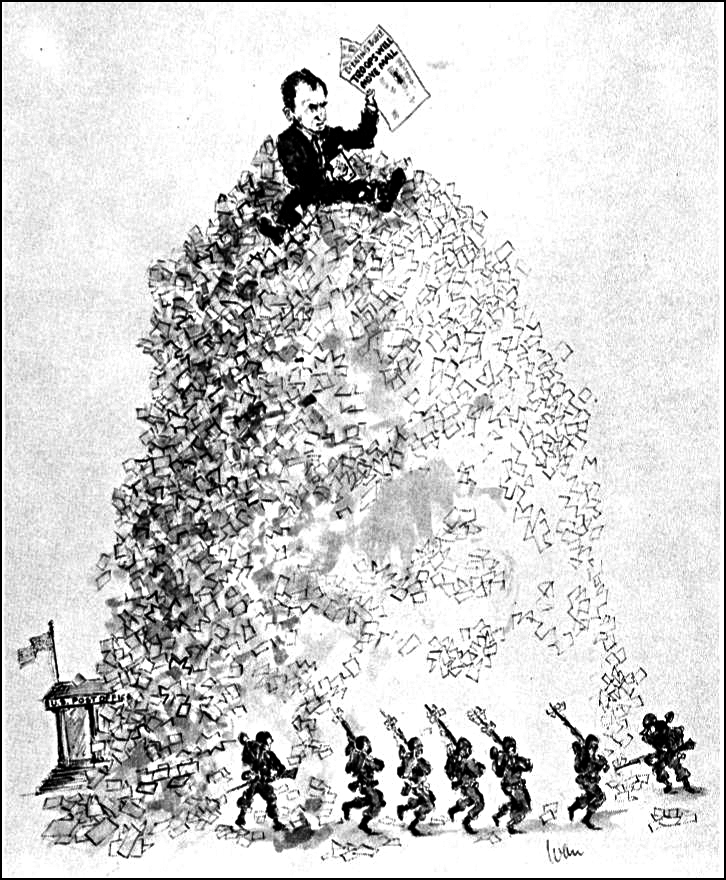Over the past two weeks, postal workers — members of the American Postal Workers Union, National Association of Letter Carriers and National Rural Letter Carriers’ Association — have organized protest actions across the country against the government, which has refused to negotiate a living wage and working conditions. These workers have gone up to 500 days without a new contract. An article about the latest protests appears below.
The government says postal workers cannot be permitted to strike to back up their just demands. They’ve said this for decades.
But in 1970 over 200,000 postal workers decided enough was enough. Starting in New York City on March 18 and then spreading across the country, they walked out.
The bosses, their government and press screamed bloody murder. Then President Richard Nixon threatened to use the U.S. Army to deliver the mail.
The Militant responded by putting out a special four-page issue of the paper explaining the reason for the strike, what it foretold about the U.S. working class, and calling for solidarity from all working people.
The strike was quickly settled, with workers winning a raise and establishing their unions’ right to negotiate wages, benefits and working conditions.
Below are excerpts from a feature, “A demonstration of labor’s power,” in that issue. Workers today confront similar pressures and are looking for ways to fight ever more effectively.
* * *
MARCH 24 — The strike of New York City letter carriers on March 18, which spread rapidly across the nation, paralyzing the postal service and causing panic in the international business world, reveals a new mood in the ranks and demonstrates the power of the working class.
It should come as no surprise that the workers’ mood, their general attitude toward the government of this country, their judgment of the employing class, and their view of their assigned position in this society show signs of radical change. This change of feeling and general outlook on the part of broad sectors of the working class is brought on by the daily deteriorating conditions of life, which accompany the unraveling of the whole tangled skein of dubious moral and social values of capitalist society.
The immediate cause of this change in attitude of millions of workers and the new mood of defiance, is the sharp downturn in real wages resulting from inflation and the consequent decline in the standard of living. But the general feeling has been growing for the past four years — since 1966 — that something is wrong and that the employers, the greedy price-gougers, their political servitors in the Republican and Democratic parties, and maybe even the government itself, are to blame.
The loss in real wages, which has just begun to affect most industrial workers, has already become a catastrophe for the postal workers. They are employees of the government, denied the right to strike for higher wages. And the result is that their pay is so far below the national standard that seven percent of letter carriers in New York City receive welfare to augment their wages.
Thousands more work a second job. They must because their starting pay is only $6,176 a year, and if they stay 21 years they can make top scale of $8,442. This explains why the letter carriers stopped making their appointed rounds.
This strike, perhaps more dramatically than any other in the history of this country, demonstrated the power of the working class.
* * *
The striking postmen have exposed the myth of “impartial” government. Simply by insisting that their employers pay them living wages, they have revealed the truth for all to see that this government is part of, belongs to, and serves the employing class.
They have demonstrated once again that everything depends upon the workers. Without the skilled labor of the postal workers the internal functioning of the greatest military power in the world is paralyzed in a few days. During World War II the miners taught the Roosevelt administration that you can’t dig coal with bayonets. It may yet be necessary for the mail sorters to teach Nixon that you can’t deliver mail with bayonets.
This does not mean that this postal strike is the beginning of the final showdown between capital and labor.
What it does reveal is that the working class is disenchanted with the status quo. As the lords of the press have so eloquently described it, “The unthinkable has happened.” This would not have occurred if the postal workers had not sensed the complete sympathy of all workers, and this sympathy has been universally expressed on every hand by the rank and file of labor throughout the course of the strike.
Workers everywhere have come to feel that if they only do something, act together, they can in fact change the conditions of their lives. The youngest and least experienced in union ways are learning from this strike and from the strikes of state and municipal workers all over the country that preceded it (especially the January 1966 New York subway strike, in which the union president, Michael Quill, was jailed), that the union is the immediate instrument — the tool to hand — to begin the fight for a better life.
They will learn quickly what it takes to win: a firm program expressing the needs of the working class and a leadership with the know-how and the courage to carry through against all obstacles. This means, in short, an anti-capitalist program and a leadership willing to challenge the capitalist government and change it.


